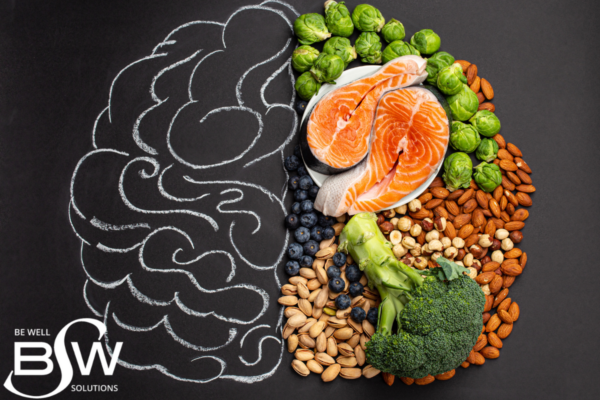Have you ever felt “butterflies in your stomach” before a significant event or during moments of stress? This sensation is not just a metaphor but a vivid illustration of how closely our gut and brain communicate, influencing our overall health and well-being.
The notion that gut health and well-being are connected is not new. Hippocrates, the father of medicine, famously stated, “All disease begins in the gut”, over 2000 years ago. Throughout history and across various cultures, dietary practices have long been devised with a focus on promoting overall health.
Your Brain and Belly talk in several ways.
Your brain and gut have bidirectional communication through several different mechanisms including:
- Direct nerve connections. The vagus nerve, a key player in the autonomic (“fight or flight”) nervous system connects directly to nerves lining the intestinal walls. These nerves are sometime called the Enteric Nervous System (ENS) or “second brain”. The vagus nerve and the ENS control the “rest and digest” portion of the autonomic nervous system.
- Hormones, acting on the gut, such as ghrelin, leptin, cortisol, insulin, and others influence hunger, digestion, cravings, and mood.
- Products of the gut microbiome. The gut microbiome is an ecosystem of bacteria and other microorganisms that live in our intestines. It plays a pivotal role in our health by influencing nutrient absorption, immune function, mood, and inflammation. The microbiome is responsible for the production of many neurotransmitters, such as serotonin, melatonin, and dopamine, that play crucial roles in our emotional balance, motivation, sleep, and energy. In fact, 95% of the body’s serotonin is produced by our gut!
The complexities of the gut-brain connection are still being worked out, but the bidirectional influences are becoming clear.
The Gut Microbiome and Health
The gut microbiome refers to a vast community of tiny living creatures, such as bacteria, viruses, fungi and other small organisms that live inside your digestive system.
Imagine it to be a garden that requires the correct balance of nutrients, water, and chemicals to thrive. Using this analogy, your brain becomes the gardener that decides when, what, and how much to feed, water and fertilize the garden (lifestyle choices). The health of the garden directly influences the gardener’s well-being and vice versa.
Intensive study of the gut microbiome has begun in earnest over the past 15-20 years. The Human Microbiome Project, supported by the National Institutes of Health (NIH), played a key role in this research by mapping the normal bacteria that live in, and on, the healthy human body.
Probiotics and Prebiotics
Probiotics are food or supplements containing living organisms that are intended to have beneficial effects on your microbiome. Certain cultured or fermented foods, such as yogurt and kefir, soft cheeses, sauerkraut, pickles and miso (soy), among others, contain probiotics that appear to be beneficial. For more information on probiotic foods, check out this article from WebMD[i].
Prebiotics are foods or supplements that help feed the good bacteria in our gut microbiome, supporting good health. Plant-based foods are the biggest source of nourishment for our microbiome. “Studies have linked higher prebiotic intake with improved blood glucose regulation, better absorption of minerals like calcium, and markers of improved digestive and immune function”[ii]. Onions, leeks, barley, garlic, kiwi, and legumes are among the top prebiotic foods.
A great deal of research has been done on supplements containing probiotics and prebiotics, but much remains to be learned about whether they’re helpful and safe for various health conditions. For a consumer overview of supplements intended to influence gut health, read this article from the National Center for Complementary and Integrative Health.[iii]
Nurturing the Gut-Brain Connection
To support the crucial gut-brain connection and enhance overall health, consider these strategies:
- Adopt a Balanced Diet: Consuming a diet rich in fiber, fruits, vegetables, and fermented foods supports a healthy gut microbiome. Incorporating prebiotic and probiotic foods can further boost beneficial gut bacteria.
- Manage Stress Effectively: Since stress adversely affects gut health, engaging in mindfulness, meditation, yoga, or other stress management techniques is beneficial.
- Prioritize Quality Sleep: Adequate sleep is essential for gut health, with disruptions potentially affecting the microbiome and overall health.
- Regular Physical Activity: Exercise can improve the gut microbiome’s diversity and health, positively impacting mood and stress levels.
- Use Antibiotics Judiciously: Antibiotics can disrupt the gut microbiome, so use them as prescribed and consider probiotics to restore balance afterward.
By understanding and nurturing the gut-brain connection through diet, stress management, sleep, and exercise, we can enhance our health and happiness. Ongoing research into this connection underscores the importance of a balanced approach to health, recognizing the intricate dance between our body and mind.
[i] https://www.webmd.com/digestive-disorders/ss/slideshow-probiotics
[ii] https://nutrition.org/scientists-name-top-five-foods-rich-in-prebiotics/#:~:text=Studies%20have%20linked%20higher%20prebiotic,improved%20digestive%20and%20immune%20function.
[iii] https://www.nccih.nih.gov/health/probiotics-what-you-need-to-know
Continue Reading April 2024 Newsletter: Functional Fitness – How It Can Improve Daily Life

